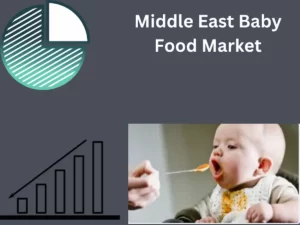© 2021 All rights reserved
Datavagyanik- Your Research Partner

The popularity of baby food is growing in the Middle East due to several factors. Firstly, there is an increasing awareness among parents about the importance of providing their babies with a nutritious and balanced diet from a young age. This has led to a growing demand for baby foods that are specifically designed to meet the nutritional needs of infants.

Secondly, the rise in the number of working mothers has also contributed to the growing popularity of baby food in the Middle East. With more women entering the workforce, there is a greater need for convenient and healthy baby food options that can be easily prepared and consumed.
Additionally, the Middle East is experiencing rapid population growth, particularly in countries like Saudi Arabia, UAE, and Qatar. This has led to a surge in the number of infants and young children, thereby increasing the demand for baby food products.
Moreover, the trend of using organic and natural products for babies is gaining momentum in the Middle East. Parents are becoming more conscious of the potential health risks associated with consuming processed and artificial foods. This has led to a growing demand for organic and natural baby food products that are free from preservatives and additives.
Saudi Arabia is the largest market for baby food in the Middle East region, accounting for a share of 40%
The Nestlé Group is the leading player in the Middle East baby food market, with a market share of more than 30%
The Middle East baby food market is expected to be driven by increasing health consciousness among parents, rising disposable incomes, and the growing demand for convenience foods.
The Middle East Baby Food market is highly fragmented with a large presence of multinationals as well as local players.
Furthermore, the expanding retail sector in the Middle East, which includes the rise of supermarkets, hypermarkets, and e-commerce platforms, has made it easier for parents to access a wider variety of baby food products from different brands and suppliers.
In conclusion, the popularity of baby food in the Middle East can be attributed to the increasing awareness of the importance of a nutritious and balanced diet, the rise of working mothers, the rapid population growth, the trend of using organic and natural products, and the expanding retail sector.
Baby food refers to a range of soft, easily consumable food products specifically designed for infants and toddlers aged between six months to two years. It is usually made by blending fruits, vegetables, cereals, and other nutritious ingredients that are easily digestible and provide the necessary nutrients for a child’s growth and development. Baby food comes in various forms, such as cereals, snacks, soups, and milk formulas. The type of food product and packaging depends on the age of the child and their developmental stage.
In the Middle East, the popularity of baby food is growing due to several factors. One of the main reasons is the increasing number of working women who do not have the time to prepare homemade food for their babies. Also, many families have a busy lifestyle and prefer the convenience of ready-to-eat baby food. Another factor is the rising awareness among parents about the importance of providing healthy and nutritious food for their babies.
The baby food market in the Middle East offers a wide range of products, including baby food cereals, snacks, soups, and milk formula. These products are available in various packaging options such as pouches, jars, bottles, and others. Additionally, the baby food market is segmented by the age of the child, with products specifically designed for infants and toddlers.
Furthermore, with increasing awareness about the harmful effects of preservatives and chemicals in food, parents are increasingly opting for organic and natural baby food. This has led to the introduction of a range of organic baby food products in the market.
In conclusion, the growing popularity of baby food in the Middle East can be attributed to the busy lifestyle of parents, increasing awareness about the importance of providing healthy and nutritious food, and the availability of a wide range of products in various packaging options and segments to cater to the needs of infants and toddlers.
The Baby Food market in Saudi Arabia is growing due to the increasing population and the increasing demand for baby food products. According to recent reports, the population of Saudi Arabia has increased by almost 4 million since 2008 and is expected to continue to grow in the coming years. This increase in population has led to an increase in demand for baby food products, as more and more parents are looking for nutritious and convenient options for their children. Additionally, the Saudi government has implemented several initiatives to encourage healthy eating habits in young children, which is also driving the growth of the baby food market in the country.
The Baby Food market in the UAE is also growing rapidly due to the rising population and the increasing demand for baby food products. The population of the UAE has increased by almost 10 million since 2008 and is expected to reach 25 million by 2030. This population growth is creating a larger demand for baby food products, as parents seek to provide their children with nutritious and convenient options. Additionally, the UAE government has implemented numerous initiatives to promote healthy eating habits in young children, which is further driving the growth of the baby food market in the country.
The middle east Baby Food market has been segmented By Product and By Packaging.
Based on the By Product, the middle east has a Baby Food market for Baby Food Cereals, Baby Food Snacks, Baby Food Soup and Milk Formula, and Frozen Baby Food. In 2021, the Milk Formula baby food segment held a significant share. This was due to the increasing demand for organic and health-conscious products. The growing awareness among parents regarding the health benefits of organic food products has strengthened the growth of the segment. Moreover, the increasing disposable incomes of consumers have further boosted the segment’s growth. This is because organic baby food is free from harmful chemicals and additives and is believed to be a healthier choice when it comes to baby nutrition. Additionally, the higher disposable incomes of consumers have allowed them to invest in higher-priced organic products, allowing the segment to grow.
Based on Packaging, the market is classified as Pouches, Jars, Bottles, and Others. In 2021, the segment is expected to account for a significant share of pouches. Pouches for baby food are expected to be one of the fastest-growing segments of the baby food market, due to their convenience and portability. This type of baby food is easy to transport and consume without preparation or utensils. Pouches are also often seen as a healthier option for parents as they are often made with natural ingredients. Additionally, they are typically more affordable than other types of baby food. For instance, pouches can cost up to 20% less than jars of baby food, making them an attractive option for price-conscious parents.
By Product
By Packaging
By Region
“Every Organization is different and so are their requirements”- Datavagyanik







© 2021 All rights reserved
Datavagyanik- Your Research Partner
Add the power of Impeccable research, become a DV client